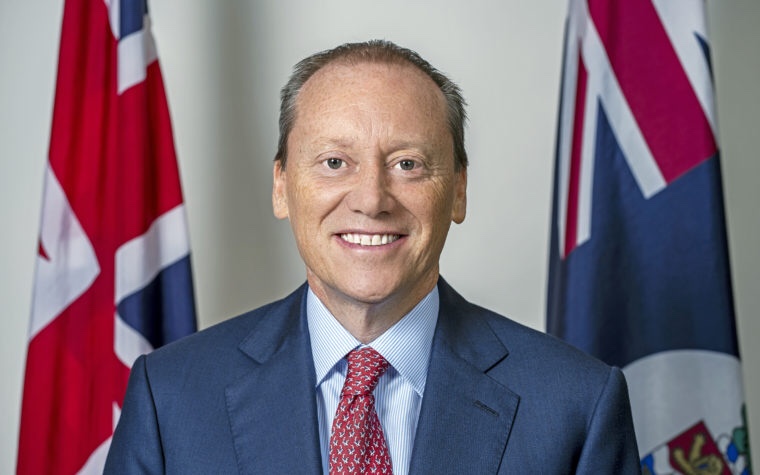GEORGE TOWN, Cayman Islands, – The Governor of the Cayman Islands Martyn Roper on Friday approved a law making same-sex partnerships legal in this British Overseas territory.
“Today we will end the discrimination being suffered by Caymanians and others on our islands whilst protecting the institution of marriage,” said Roper.
“This action does not alter or undermine the strong Christian heritage and values of the people of the Cayman Islands. No-one is being asked to change their long-held beliefs.”
The Governor, in his statement, said this is in line with instructions from UK government ministers to use his reserved powers under Section 81 of the Constitution.
The changes to the law came into effect on Friday, after being gazetted .
However, the Civil Service requires a delay of 21 days before starting to accept and process applications for registration of civil partnerships”.
The law, which was formerly titled the Domestic Partnership Bill, was defeated in the Legislative Assembly on July 29, when lawmakers voted down the bill, nine to eight.
But the Governor, using his reserved powers to write legislation, opted to reintroduce the bill and assent to it following 21 days of public consultation.
In his statement, Roper said a number of amendments were made to the draft legislation discussed by the Legislative Assembly.
“These were aimed principally at strengthening the effectiveness of the Legislation. As previously announced, the title has changed to Civil Partnership in response to feedback received. A number of pieces of consequential legislation have been updated to ensure they apply to those who enter civil partnerships,” he said.
Among the changes is a provision to view the names placed on the Civil Partnerships Register. The registrar may allow a person or organisation with an adequate reason to view the Civil Partnerships Register.
In deciding to grant access, the registrar must consider the nature of the applicant’s interest; the sensitivity of the information; the use to be made of the information; and any other prescribed factors.
The legislation also mandates that public notices of civil partnerships be displayed for seven days, down from a proposed 14 days.
Roper said he hopes that citizens can now move forward with their lives and come together as a community.
“Let us refocus our energies on pressing matters, such as responding to the global pandemic, rebuilding our economy and protecting our environment.”
The governor urged everyone to “recognise that same-sex couples have the right to legal and financial protection like everyone else. Accepting diversity and difference shows to the world that we are a caring community based on mutual respect, tolerance and equality for all.”
He also reiterated that the Cayman Islands retains its full autonomy for domestic issues, including in education and immigration matters.
“The UK fully respects Cayman’s autonomy in domestic affairs. Indeed, this will be made even clearer in the package of constitutional changes that are likely to be adopted later this year. UK intervention in this manner is extremely rare,” he added.
Addressing fears within the community that this will be the first of many instances in which the UK, through the governor’s reserved powers, will enact law changes, Roper said, “As Governor, it is not a position I would ever have wanted to be in. Abolition of the death penalty in 1991 and legalising homosexuality in 2000 were previous examples where the UK intervened to ensure its legal and international obligations, in a British Overseas Territory, were upheld. It is wrong to suggest that the UK will seek additional pretexts for intervening.”
Roper reiterated his earlier contention that the UK had “no option” but to step in to ensure Cayman complies with the rule of law and international obligations under the terms of the European Convention on Human Rights.
He said Cayman is required to provide a legal framework for same-sex couples that is functionally equivalent to marriage.
“That is necessary to comply with our own courts and our Constitution. The Government of the Cayman Islands and the Attorney-General have accepted that this is a legal requirement that cannot be ignored. As the Court of Appeal stated – that Cayman had such an obligation has been apparent for several years. An important principle in our Constitution and Bill of Rights is the protection of minorities. That principle protects all of us, now and in the future. We cannot pick and choose which rights are protected,” he said.
Meanwhile, the group known as Colours Cayman – a local non-profit that aims to foster a safe and comfortable social environment for the lesbian, gay, bisexual, transgender, queer, intersex and asexual (LGBTQIA+) community has welcomed the Governor’s approval of the law.
However, the group, in a statement, also stressed that absolute marriage equality is “the only true means of achieving equality” and has applied to the Privy Council to intervene in support of same sex marriage in the Cayman Islands.
Colours Cayman sstated that as an organisation, it appreciated the opportunity provided by the governor to submit comments on the bill and other amendments.
“While the law certainly falls short of providing full equality to same-sex couples, it is nevertheless a significant step forward for all of the Caribbean region and the Cayman Islands has now become something of a beacon of hope. Ours has become the only commonwealth jurisdiction in the region to have made such a step by legislation. Legislation that affords same-sex couples, finally, the equivalent rights to which they are entitled and that have long been afforded to different-sex couples through marriage,” the statement said.
The non-profit thanked the Attorney General’s Chambers and the Governor’s Office for facilitating an open discussion with it “to deliver the best possible outcome for the Cayman Islands” following the Court of Appeal’s decision last November.
However, it said its view has not changed on the issue of same-sex marriage.
(Source: Barbados Today)

